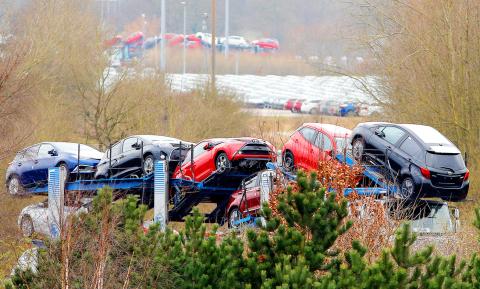Toyota Motor Corp plans to upgrade its UK carmaking plant in a sign that concerns about Brexit will not derail its investments in the country for now.
The world’s second-biggest automaker is to spend £240 million (US$294 million) to update equipment and technology at a factory in Burnaston, England, to allow the production of models on its latest platform, Toyota said on Thursday.
The UK government will supply as much as £21.3 million of that for training, research and development, subject to due diligence, the carmaker said.

Photo: Reuters
“We are very focused on securing the global competitiveness of our European plants,” Toyota Motor Europe chief executive Johan van Zyl said in a statement.
However, he added that “continued tariff-and-barrier free market access between the UK and Europe that is predictable and uncomplicated will be vital for future success.”
Carmakers are concerned that the UK’s exit from the EU might lead to costly trade barriers, hampering the free movement of components and vehicles between production sites and end consumers across Europe.
Toyota rival Nissan Motor Co has said it wants the government to spend £100 million to help build the nation’s supply base and pledged to expand production at its Sunderland plant only after receiving assurances about Britain’s policies toward the industry.
Ford Motor Co is planning to cut costs at its Bridgend engine plant in Wales, which could mean job losses, and BMW AG is reportedly weighing whether to build its electric Mini in Germany rather than its factory near Oxford, after Brexit.
Toyota’s investment is part of a global upgrade of facilities and is not related to Brexit, a company spokesman said.
More than 75 percent of the 180,000 Auris and Avensis vehicles that came out of that factory last year were exported to mainland Europe.
The upgrade of the factory will enable production of new vehicles using the so-called Toyota New Global Architecture (TNGA), which debuted on the Prius hybrid in 2015.
Toyota says the TNGA program aims to trim manufacturing costs by as much as 30 percent.

The Eurovision Song Contest has seen a surge in punter interest at the bookmakers, becoming a major betting event, experts said ahead of last night’s giant glamfest in Basel. “Eurovision has quietly become one of the biggest betting events of the year,” said Tomi Huttunen, senior manager of the Online Computer Finland (OCS) betting and casino platform. Betting sites have long been used to gauge which way voters might be leaning ahead of the world’s biggest televised live music event. However, bookmakers highlight a huge increase in engagement in recent years — and this year in particular. “We’ve already passed 2023’s total activity and

Nvidia Corp CEO Jensen Huang (黃仁勳) today announced that his company has selected "Beitou Shilin" in Taipei for its new Taiwan office, called Nvidia Constellation, putting an end to months of speculation. Industry sources have said that the tech giant has been eyeing the Beitou Shilin Science Park as the site of its new overseas headquarters, and speculated that the new headquarters would be built on two plots of land designated as "T17" and "T18," which span 3.89 hectares in the park. "I think it's time for us to reveal one of the largest products we've ever built," Huang said near the

China yesterday announced anti-dumping duties as high as 74.9 percent on imports of polyoxymethylene (POM) copolymers, a type of engineering plastic, from Taiwan, the US, the EU and Japan. The Chinese Ministry of Commerce’s findings conclude a probe launched in May last year, shortly after the US sharply increased tariffs on Chinese electric vehicles, computer chips and other imports. POM copolymers can partially replace metals such as copper and zinc, and have various applications, including in auto parts, electronics and medical equipment, the Chinese ministry has said. In January, it said initial investigations had determined that dumping was taking place, and implemented preliminary

Intel Corp yesterday reinforced its determination to strengthen its partnerships with Taiwan’s ecosystem partners including original-electronic-manufacturing (OEM) companies such as Hon Hai Precision Industry Co (鴻海精密) and chipmaker United Microelectronics Corp (UMC, 聯電). “Tonight marks a new beginning. We renew our new partnership with Taiwan ecosystem,” Intel new chief executive officer Tan Lip-bu (陳立武) said at a dinner with representatives from the company’s local partners, celebrating the 40th anniversary of the US chip giant’s presence in Taiwan. Tan took the reins at Intel six weeks ago aiming to reform the chipmaker and revive its past glory. This is the first time Tan